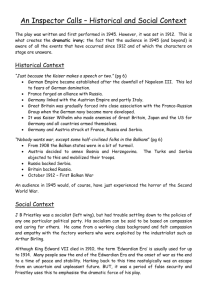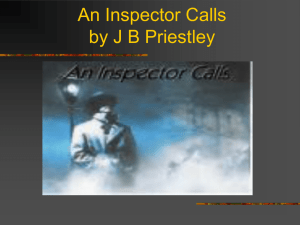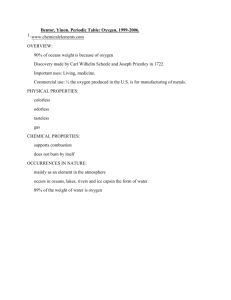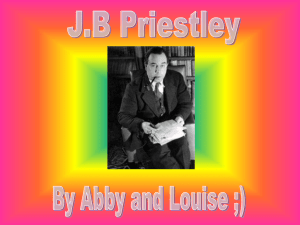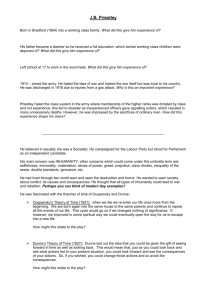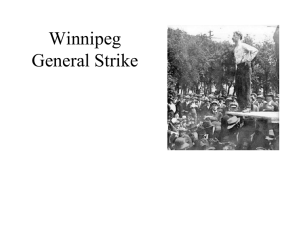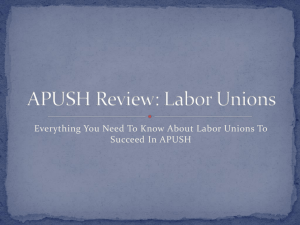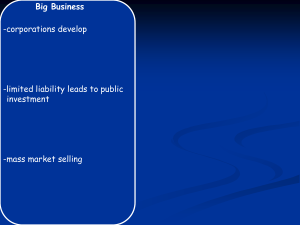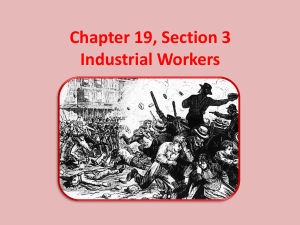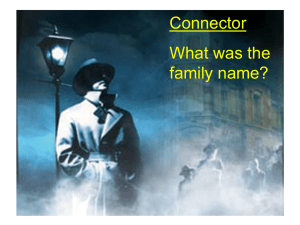File
advertisement
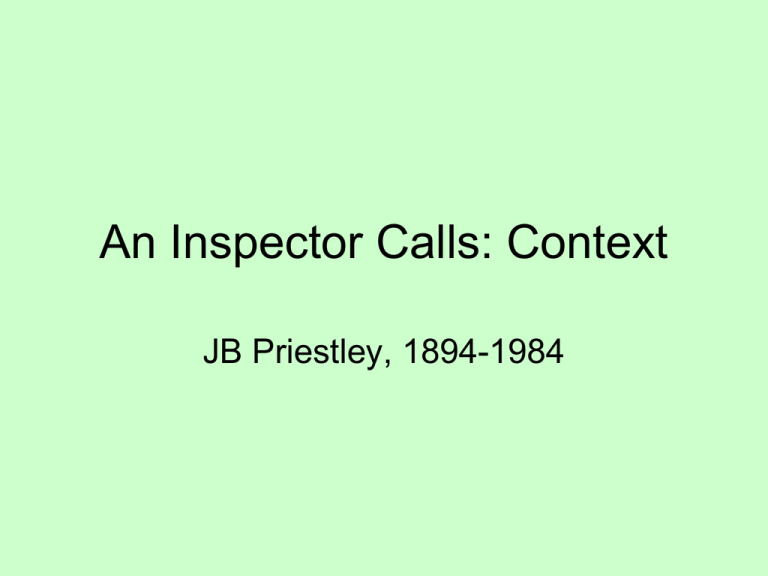
An Inspector Calls: Context JB Priestley, 1894-1984 How much money proportionally should the maker of a pair of Nikes earn? JB Priestley Biography • Left school at 16: “I believed that [experience of] the world outside the classrooms and labs would help me to become a writer.” • 1911-14: formative years, associates did not do the ‘social chit chat’ but rather discussed ‘real talk and hot argument’. Priestley stated that it was these years that ‘set their stamp upon me’ (the time before the first world war). He had political discussions with his father’s socialist friends. What is Socialism? “The establishment of a system of society based upon the common ownership and democratic control of the means and instruments for producing and distributing wealth by and in the interest of the whole community.” The Socialist party of Great Britain Priestley’s Biography (cont) • Called up 1914-19, front line service: experience of war summed up by two key points—narrowly surviving a German shell; being the victim of a gas attack • Went to university after WW1: began writing novels, then plays: ‘to prove that a man might produce long novels yet be able to write effectively, using the strictest economy, for the stage’ • 2 themes recur in his plays: the effects of an individuals actions over a period of time; the Collective and Individual responsibility for actions and their consequences. • Had a radio show reflecting on WW2 conditions, but were cancelled for his being too critical of the government Contemporary Theatre in the 1940s • Before WW2 theatres were very popular. • Since the introduction of cinemas, theatres had been competing with musicals with lavish sets, costumes and budgets. • With the coming of WW2, theatres opened and closed erratically due to air raids. • Performances were relocated to the North or the Midlands. • By 1944 the Old Vic Theatre Company had returned to London and the play was first staged in 1946. TWO KEY DATES 1912 1945 • The date that the play was set in: Edwardian England. • Huge social divisions and distinctions • A year of key traumatic events • Suffragette movements: Repeated introduction of woman’s suffrage bills to parlt defeated between 1896-1911, militant campaign by Emmeline Pankhurst since 1906 • The date that the play was written. • Post-war ennui: egocentric tension of the people, concentrate on their own business. • Dramatic Irony from the start: audience looking back from the vantage point of time Edwardian England 1912: Arthur Birling’s England • Huge social divisions and distinctions • ‘class divisions were never so acutely felt as by the Edwardians’ • Massive differences in income, wealth, and living standards • 87% of the country’s wealth was owned by 5% of the people • 7000 people owned 4/5 of England’s land. • 8 million people had to get by on less than 25 shillings a week (£1.25): as a result they were ‘underfed, underhoused and insufficiently clothed.... Their growth is stunted, their mental powers are cramped, their health undermined.’ • Female workers near the bottom of the pile Poverty Legislation Date 1906 1908 1909 1911 1911 Legislation School Meals Act Old Age Pensions Act Labour Exchanges established National Insurance Act, dealing with health and unemployment Legislation demanding stricter safety measures in coal mines, regular meal breaks, weekly half day holiday. OR... “It was the golden age of the country weekend, of the London season, of the new business tycoons, of the Gaiety girls (who sometimes married not tycoons but aristocrats), of the bustle and of the top hat, but, above all, of the golden sovereign.” The end of an ‘age of innocence’. Death, the great equaliser, came to all classes – 1st, 2nd or 3rd – aboard the Titanic. ‘These silly little war scares’ • 1905-14: England in costly arms race with Germany, increasing likelihood of war: over 40 new battleships (dreadnoughts) commissioned and constructed, costing each year between £31-45 million. • £229 million spent in 6 years: half of this would have cured the country’s social problems. Industrialisation • Such mass industrialisation led to the potential (and reality) of massive fortunes for those who have the abilities to get it: manufacturing trades, etc. ‘lower costs and higher prices’ • However, the period leading up to 1912 was blighted by increasing industrial unrest, known as the Great Unrest Date Action 1901 Taff Vale Decision gave compensation to the railway company for striking workers, effectively outlawing trade unions 1911 June, a seamen’s strike begins in Southampton Dockers and railway workers strike in Liverpool: troops called in London Dockers strike for a wage increase from 6d to 8d an hour National railway strike: troops sent to Manchester December, Miners vote to strike for better pay and working conditions 1912 March 1st, 1 million miners on strike: most extensive and complete stoppage in British History Govt soon gives way, conceding a Minimum Wage Act Population Expansion • Birlings live in Brumley, N. Midlands (traditionally set in Yorkshire): mighty industrial heartlands, rampantly hypocritical, unjust and depressing. 1800 1850 1900 Birmingham 71,000 215,000 760,000 Bolton 1000 3000 47,000 Bradford 13,000 104,000 280,000 Leeds 53,000 172,000 429,000 Manchester 75,000 340,000 645,00 • Huge housing pressure: wealth moved out of centres, poor crammed into back to back houses or long terraces, unsanitary overcrowding, smoke, filth, poor public health, massively reduced life expectancy. Breakout of War 1914-19 • Few foresaw what was a localised conflict with the Balkans to turn into all-out slaughter • Grateful to prove their chance in battle: Rupert Brooke, ‘God be thanked that he hath matched us with the hour’. • It should have been over by Christmas ‘I noticed... a present for any good child called Jolliboy II Quick-firing Machine Gun (See How Quickly Pellets Are Ejected), and as I walked away I hoped that the jolly boys who played with it would never find themselves caught in the barbed wire with a stream of hot lead disembowelling them. The people who sell that toy might be encouraged to give away with it a few photographs showing what its parent toy can do to a man’s guts.’ (Priestly, An English Journey) Post-War Britain: Rebuilding Britain • How? Radical ideas voiced: redistribution of wealth, common ownership of industries and resources, health and welfare, long term security • Trying to solve the problems of unrestrained capitalism, self-interest, a lack of understanding of how society inter-connects • Priestley did not want to see a return to the values of 1912 or 1930s where the moneyed classes ruled and working people received little recognition • → Post-war welfare state. Labour’s famous landslide victory of 1945, Attlee ousting Churchill: physical, social, political reconstruction
